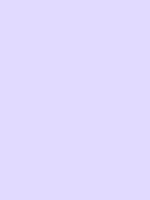#e1daff Color Information
In a RGB color space, hex #e1daff is composed of 88.2% red, 85.5% green and 100% blue. Whereas in a CMYK color space, it is composed of 11.8% cyan, 14.5% magenta, 0% yellow and 0% black. It has a hue angle of 251.4 degrees, a saturation of 100% and a lightness of 92.7%. #e1daff color hex could be obtained by blending #ffffff with #c3b5ff. Closest websafe color is: #ccccff.
-
- R 88
- G 85
- B 100
-
- C 12
- M 15
- Y 0
- K 0
● #e1daff color description : Very pale blue.
#e1daff Color Conversion
The hexadecimal color #e1daff has RGB values of R:225, G:218, B:255 and CMYK values of C:0.12, M:0.15, Y:0, K:0. Its decimal value is 14801663.
| Hex triplet | e1daff | #e1daff |
|---|---|---|
| RGB Decimal | 225, 218, 255 | rgb(225,218,255) |
| RGB Percent | 88.2, 85.5, 100 | rgb(88.2%,85.5%,100%) |
| CMYK | 12, 15, 0, 0 | |
| HSL | 251.4°, 100, 92.7 | hsl(251.4,100%,92.7%) |
| HSV (or HSB) | 251.4°, 14.5, 100 | |
| Web Safe | ccccff | #ccccff |
| CIE-LAB | 88.624, 9.361, -17.118 |
|---|---|
| XYZ | 74.169, 73.37, 104.857 |
| xyY | 0.294, 0.291, 73.37 |
| CIE-LCH | 88.624, 19.51, 298.672 |
| CIE-LUV | 88.624, 1.575, -28.745 |
| Hunter-Lab | 85.656, 4.664, -12.621 |
| Binary | 11100001, 11011010, 11111111 |
Color Schemes with #e1daff
Alternatives to #e1daff
Below, you can see some colors close to #e1daff. Having a set of related colors can be useful if you need an inspirational alternative to your original color choice.
#e1daff Preview
This text has a font color of #e1daff.
<span style="color:#e1daff;">Text here</span>This paragraph has a background color of #e1daff.
<p style="background-color:#e1daff;">Content here</p>This element has a border color of #e1daff.
<div style="border:1px solid #e1daff;">Content here</div>.text {color:#e1daff;}.background {background-color:#e1daff;}.border {border:1px solid #e1daff;}Shades and Tints of #e1daff
A shade is achieved by adding black to any pure hue, while a tint is created by mixing white to any pure color. In this example, #000002 is the darkest color, while #f1eeff is the lightest one.
-
#000002
#000002rgb(0,0,2) -
#040016
#040016rgb(4,0,22) -
#080029
#080029rgb(8,0,41) -
#0c003d
#0c003drgb(12,0,61) -
#0f0051
#0f0051rgb(15,0,81) -
#130064
#130064rgb(19,0,100) -
#170078
#170078rgb(23,0,120) -
#1a008c
#1a008crgb(26,0,140) -
#1e009f
#1e009frgb(30,0,159) -
#2200b3
#2200b3rgb(34,0,179) -
#2600c6
#2600c6rgb(38,0,198) -
#2900da
#2900dargb(41,0,218) -
#2d00ee
#2d00eergb(45,0,238)
-
#3202ff
#3202ffrgb(50,2,255) -
#4216ff
#4216ffrgb(66,22,255) -
#5229ff
#5229ffrgb(82,41,255) -
#623dff
#623dffrgb(98,61,255) -
#7251ff
#7251ffrgb(114,81,255) -
#8264ff
#8264ffrgb(130,100,255) -
#9178ff
#9178ffrgb(145,120,255) -
#a18cff
#a18cffrgb(161,140,255) -
#b19fff
#b19fffrgb(177,159,255) -
#c1b3ff
#c1b3ffrgb(193,179,255) -
#d1c6ff
#d1c6ffrgb(209,198,255) -
#e1daff
#e1daffrgb(225,218,255) -
#f1eeff
#f1eeffrgb(241,238,255)
Tones of #e1daff
A tone is produced by adding gray to any pure hue. In this case, #ecebee is the less saturated color, while #e1daff is the most saturated one.
-
#ecebee
#ecebeergb(236,235,238) -
#ebeaef
#ebeaefrgb(235,234,239) -
#eae8f1
#eae8f1rgb(234,232,241) -
#e9e7f2
#e9e7f2rgb(233,231,242) -
#e8e5f4
#e8e5f4rgb(232,229,244) -
#e7e4f5
#e7e4f5rgb(231,228,245) -
#e6e3f6
#e6e3f6rgb(230,227,246) -
#e5e1f8
#e5e1f8rgb(229,225,248) -
#e5e0f9
#e5e0f9rgb(229,224,249) -
#e4defb
#e4defbrgb(228,222,251) -
#e3ddfc
#e3ddfcrgb(227,221,252) -
#e2dbfe
#e2dbfergb(226,219,254) -
#e1daff
#e1daffrgb(225,218,255)
Color Blindness Simulator
Below, you can see how #e1daff is perceived by people affected by a color vision deficiency. This can be useful if you need to ensure your color combinations are accessible to color-blind users.
